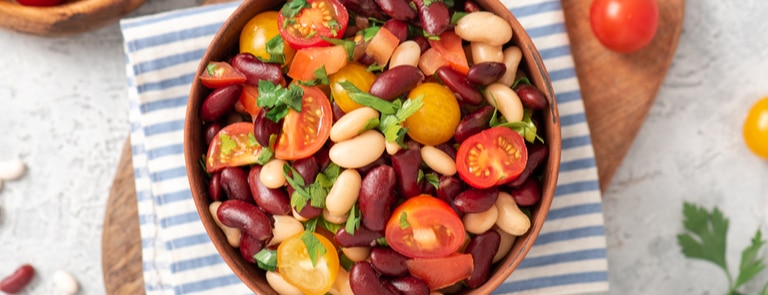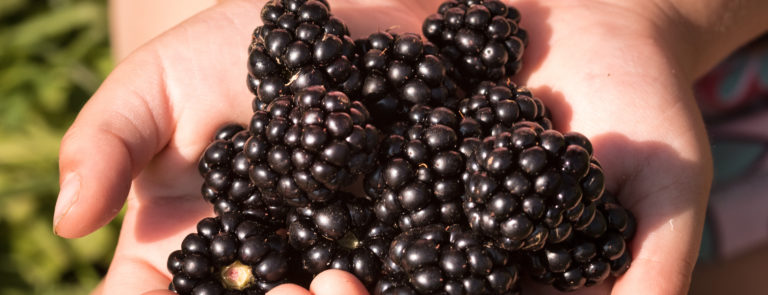20% off €35
What are the main benefits of being vegetarian?

Are you thinking about becoming a vegetarian or are you simply interested in the benefits of switching to a meat-free diet?
Whether it is for your health, the environment, religion, a love of animals, or even to save money, there has never been a better time to go vegetarian.
People are eating less meat in the UK than ever and as a result, the meatless food market has seen a massive boost. You now have a vast and varied range of choices in restaurants and supermarkets.
Whatever your reasons, vegetarianism can bring many benefits.
Skip to:
What does it mean to be vegetarian?
A vegetarian diet does not contain fish, meat or chicken.1
That also extends to related products, such as seafood, gelatine or animal rennet, and stock or fat made from animals.
Typical components of a vegetarian diet might include fruit and vegetables, grains, pulses, seeds, nuts, eggs and dairy products.
The different types of vegetarianism
The ‘classic’ vegetarian (Lacto-Ovo vegetarian)
- Eats no meat or fish
- Eats dairy products, e.g., cheese and milk
- Eats eggs
Lacto vegetarian
- Eats no meat or fish
- Eats dairy products, e.g., cheese and milk
Ovo vegetarian
- Eats no meat or fish
- Eats eggs
Pescetarian
- Eats no meat but eats fish
- Eats dairy products, e.g., cheese and milk
- Eats eggs
Flexitarian
- Eats meat or fish sometimes
- Eats dairy products, e.g., cheese and milk
- Eats eggs
A vegetarian vs a vegan diet
There are obvious similarities between vegan and vegetarian diets. However, we will be looking at the benefits of being vegetarian here.
Whereas a vegan would not eat honey, as bees produce it, it would not typically be excluded from a vegetarian diet.
If you want to learn more about a vegan diet and food, why not head to the Vegan section in our Health Hub. Otherwise, continue to read about the wide-ranging benefits of adopting a diet free of meat and fish.
The positive impact of vegan and vegetarian diets on the environment
Growing concerns around climate change, animal welfare and land use can impact people’s food and diet choices.
Livestock causes more pollution than the world’s entire transport system.2
Therefore, a healthy shift to a vegetarian or vegan diet can and does make a difference in reducing carbon and other emissions.
So, if you are thinking about your health and the health of our planet, choosing to go vegetarian will have a positive difference on both.
How to be a healthy vegetarian
Let’s get one thing straight. Not all vegetarians are healthy! And an unbalanced vegetarian diet brings minimal health benefits.
So, keep general healthy eating habits in mind when working out what to eat.
The NHS Eat Well guidance highlights that vegetarians, just like everyone, need to make sure they: 3
- Get at least five a day of those essential fruits and vegetables
- Choose unsaturated fats over saturated ones
- Include some dairy or dairy alternatives
- Choose wholegrain starchy carbohydrates
- Obtain some protein from sources such as eggs, pulses or beans
- Drink plenty of fluids
It can be challenging to remember to adhere to these fundamental principles of healthy heating when working out a new eating method.
But looking at vegetarian food choices, it is easy to see why eating a balanced vegetarian diet can help you exceed most guidelines for healthy eating. The increase is because your meals will be naturally high in fibre and saturated fat.4
Many people find that being vegetarian helps them maintain a healthy weight and can help reduce the chance of some health conditions. But this is only if they are not eating greasy veggie burgers and chips washed down with ice cream and wine for every meal!
Several studies have looked at the effects of a vegetarian diet on various health conditions.
While it is difficult to be specific about what foods or habits benefit health conditions, there is a positive correlation between health and vegetarianism. 5
6 health benefits of vegetarianism
Wondering exactly how going vegetarian can benefit your health? Keep reading to find out!
-
May contribute to reducing blood pressure
One potential health benefit of going veggie is its effect on blood pressure.
A study published in the American Journal of Nutrition from 2013 found that consuming a vegetarian diet was associated with lower systolic blood pressure, compared to the participants that ate meat and fish.6,7,8
-
May help lower ‘bad’ cholesterol levels
The same study we mentioned above also highlighted that the ratio of total to HDL cholesterol were all significantly lower in vegetarians than in nonvegetarians, suggesting that it could have a positive effect on cholesterol levels.9,10,11
-
May contribute to lower risk of osteoporosis
Interestingly, rates of osteoporosis are said to be significantly lower in places where people mainly eat a vegetarian diet.
One study published in the American Journal of Clinical Nutrition found that people who had followed a Lacto-Ovo vegetarian diet for at least 20 years experienced less bone density loss by the time they reached 80 years old, than nonvegetarians.12
-
Lower intake of saturated fats
Due to the nature of vegetarian foods, it’s a possibility that you’ll naturally reduce the level of saturated fat in your diet – mainly by cutting out meat.
Obviously, if you choose to eat a lot of hard cheese and chocolate, it’s not much healthier, but a predominantly plant-based diet is instead packed with fibre, vitamins and minerals.
-
It may benefit your skin health
Swapping out an unbalanced diet where you eat a lot of meat and processed food for a vegetarian diet with lots of whole foods may be good for your skin.
This idea was studied in a 2020 review, where it was concluded that a whole-food, plant-based diet maximises the antioxidant potential within our cells and may slow signs of skin aging.13
-
A vegetarian diet is cheaper
Okay, this isn't exactly to do with health, but it's definitely a benefit!
Did you expect that eating vegetarian meals would cost you significantly less than one that contains meat or fish?
Perhaps surprisingly, there are financial benefits to eating a plant-based diet too.
Essential nutrients for vegetarians
There are certain nutrients that meat-eaters get naturally through their diets that a vegetarian might need to make sure they obtain.
These nutrients are easy to incorporate into your vegetarian diet if you know where you might be falling short of your recommended daily intake.
Iron
Iron is abundant in meat and seafood and is essential for energy production and immunity support.
Vegetarians can easily get their daily quota of iron. Men require 8.7mg per day, whilst women under 50 need 14.8mg. Women over 50, however, require less iron at 8.7mg.14
Food suggestion: Things like beans, nuts, dried fruit, brown rice and dark green leafy vegetables are naturally high in iron. In addition, many breakfast cereals are fortified with iron – just watch the sugar content.
Handpicked content: Iron-rich vegetarian recipes
Protein
Dairy products like cheese and milk contain protein, so Lacto-Ovo and Lacto vegetarians will quickly meet their quota.
The recommended daily protein intake is 0.75g per kilogram you weigh in the UK, so a 60kg person would require around 45g of protein each day.15
Lacto-Ovo and Ovo vegetarians can get protein from eggs. There is around a quarter of your daily protein in one boiled egg.
Food suggestion: Protein can also be found in brown rice, nuts, seeds, quinoa, seitan (wheat gluten), tofu, chickpeas and other beans, soya milk, chia seeds and oats. These are mostly incomplete proteins but combining two plant proteins from different plant species makes it a complete protein. For instance, oats + nuts = complete protein.
You can find out more about how to include protein in your vegetarian diet by checking out our article, best vegetarian foods that are high in protein.
Vitamin B12
This vitamin has a variety of vital functions within the body, from helping to release energy from food to keep normal function of your nervous system healthy.16
Food suggestion: Vitamin B12 is abundant in dairy products like milk, cheese and eggs. Plant-based sources of vitamin B12 are more challenging to come by, however, they can be found in soy products, fortified breakfast cereals and nutritional yeast.
Omega-3 essential fatty acids
Omega-3 fatty acids help fight inflammation in the body and help keep our hearts and vision brains, guts, joints and eyes in normal condition.
The three primary omega-3 fatty acids are EPA (eicosapentaenoic acid), DHA (docosahexaenoic acid) and ALA (alpha-linolenic acid). Unfortunately, your body can’t make them, so you must get them from your food.
The most common source of omega-3 is oily fish. However, vegetarians need not worry. All three can be found in plant sources, too.
Food suggestion: Linseeds contain EPA, while algae such as spirulina and chlorella contain DHA and ALA.
Why not add flaxseed, spirulina and chlorella to a fruit smoothie to get your omega-3 in one go?
Want to make sure you’re getting the right amount of these foods? Check out our one day vegetarian meal plan to help get you started.
Don’t get caught out
Cutting out certain food types can be confusing, and some food products may contain ingredients that you’ll need to be aware of.
We’ve listed some items below that you might think are vegetarian – but aren’t always.
- Alcohol – according to DrinkAware, some alcoholic drinks contain isinglass (a substance obtained from fish bladders).17
- Parmesan – this hard Italian cheese contains rennet, which comes from enzymes in animal stomachs. Luckily, generic Italian hard cheese (not Parmesan) is vegetarian, but we’d still recommend checking.
- Sweets – soft, gummy sweets often contain gelatin, made from collagen from animals’ skin, bones and hooves. Check the label for ‘Suitable for Vegetarians’ before digging in.
- Roast potatoes – OK, we don’t mean to spoil your fun, but these are often cooked in goose, duck or chicken fat in pubs and restaurants. Best to check!
The final say
Ready to make the switch? There’s never been a better time to go veggie. With a variety of lifestyle and potential health benefits, what’s stopping you?
If you have any queries or any pre-existing medical conditions that you feel could be affected by switching to a vegetarian diet, please speak to a medical professional beforehand.
Last updated: 17 May 2022
- https://vegsoc.org/info-hub/definition/
- https://vegsoc.org/info-hub/why-go-veggie/environment/
- https://www.nhs.uk/live-well/eat-well/how-to-eat-a-balanced-diet/eating-a-balanced-diet/
- https://vegsoc.org/info-hub/health-and-nutrition/
- https://www.tandfonline.com/doi/abs/10.1080/10408398.2016.1138447?journalCode=bfsn20&
- https://academic.oup.com/ajcn/article/97/3/597/4571519
- https://www.health.harvard.edu/heart-health/vegetarian-diet-linked-to-lower-blood-pressure-
- https://www.ncbi.nlm.nih.gov/pmc/articles/PMC7352826/
- https://academic.oup.com/ajcn/article/97/3/597/4571519
- https://www.ncbi.nlm.nih.gov/pmc/articles/PMC4845138/
- https://pubmed.ncbi.nlm.nih.gov/28938794/
- https://www.ncbi.nlm.nih.gov/pmc/articles/PMC7380694/
- https://www.nhs.uk/conditions/vitamins-and-minerals/iron/
- https://www.nutrition.org.uk/healthy-sustainable-diets/protein/?level=Health%20professional
- https://www.nhs.uk/conditions/vitamin-b12-or-folate-deficiency-anaemia/
- https://academic.oup.com/ajcn/article-abstract/48/3/837/4716547
- https://www.drinkaware.co.uk/facts/alcoholic-drinks-and-units/units-and-calories-in-alcoholic-drinks/vegan-alcohol



